Whether itŌĆÖs in medical technology, magnetic materials or understanding how children learn language, a great deal of Dal research is driven by graduate students. ║┌┴Ž│į╣Ž═°hosts more than 3,300 masterŌĆÖs and PhD students across the university, each of them making their own contributions to discovery, innovation and the generation of new knowledge.
On Wednesday morning (January 20), Kelly Regan, Nova ScotiaŌĆÖs minister of Labour and Advanced Education, is on campus to recognize the contributions of those grad students supported by the Nova Scotia Graduate Scholarship program. Launched in 2014, the program aims to invest $3.7 million annually in graduate student research when itŌĆÖs fully phased in over the next few years.
"These scholarships help support graduate students who are committed to continuing their education and research here in Nova Scotia," says Minister Regan. "Not only will these scholarships help more students and young people build a life and career here in Nova Scotia, they will also help boost our economy as research turns into new products and more opportunities."
Making an impact in our region
Bonita Squires is one of those students. Originally from British Columbia, she is the first student in DalhousieŌĆÖs new Health PhD program, hosted by the Faculty of Health Professions. What brought her to the east coast was her work in sign language interpretation, and it was through her connections with the Atlantic Provinces Special Education Authority (APSEA) that she was inspired to pursue PhD studies.
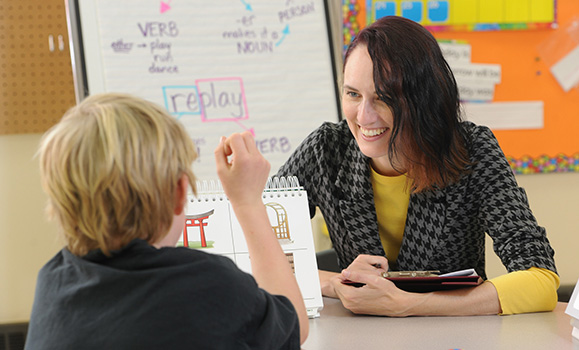
ŌĆ£ItŌĆÖs an organization thatŌĆÖs really unique across North America,ŌĆØ says Squires, explaining the organizationŌĆÖs pan-provincial approach to working with children who are deaf or hard-of-hearing, integrated within the school system. Her research focuses not on the childrenŌĆÖs physical ability to hear, but their literacy and language acquisition skills. In her research ŌĆö supervised by Elizabth Kay-Raining Bird of the School of Human Communication Disorders and H├®l├©ne Deacon from the Departent of Psychology and Neuroscience ŌĆö she plans to conduct an assessment study and an intervention with teachers and students in Nova Scotia and New Brunswick focused on morphemes, the various components of words that add or modify meaning.
ŌĆ£IŌĆÖve met so many students and adults in the community who are deaf or hard-of-hearing, some who do and others who do not use sign language, and you see these patterns,ŌĆØ says Squires. ŌĆ£We need to learn more about what their language ability is: how are their language skills developing, how is their literacy evolving?ŌĆØ
Research talent
As Nova ScotiaŌĆÖs leading research institution, ║┌┴Ž│į╣Ž═°hosts the majority of NSGS awards in the province. In the programŌĆÖs first year (2014-15), 155 masterŌĆÖs and PhD students received scholarships. This year (2015-16), there were an additional 115 scholarships awarded. Across both years, approximately 30 per cent of the scholarships went to international students, helping support recruitment and retention of global research talent to the province.
Dinesha Thapa, a masterŌĆÖs student in DalhousieŌĆÖs Department of Pharmacology, came to Nova Scotia from Nepal to study how non-addictive natural constituents found in cannabis plants may hold potential drug solutions for chronic pain.
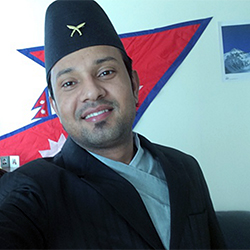 ŌĆ£This scholarship really means a lot for the people like me who come from underdeveloped nation in quest of new drug discovery,ŌĆØ says Thapa, whose project is supervised by Melanie Kelly. ┬ĀŌĆ£I will always do my best to bring something new in the field of new drug development by continuously working in pharmacological research.ŌĆØ
ŌĆ£This scholarship really means a lot for the people like me who come from underdeveloped nation in quest of new drug discovery,ŌĆØ says Thapa, whose project is supervised by Melanie Kelly. ┬ĀŌĆ£I will always do my best to bring something new in the field of new drug development by continuously working in pharmacological research.ŌĆØ
The awards are valued at $10,000 annually for two years for masterŌĆÖs students and $15,000 annually for four years for PhD students. The recipients, selected based on nominations made by DalhousieŌĆÖs academic departments and administered using the Canada Graduate Scholarship application processes, must be conducting research linked with at least one of Nova ScotiaŌĆÖs priority research areas. In 2015-16, DalŌĆÖs recipients covered all nine priority areas ŌĆö┬Āmany connecting with multiple priorities ŌĆö with the largest concentrations in health and wellness (49), life sciences (43) and ocean science and technology (23).
HereŌĆÖs more details on some of the Dal students supported by Nova Scotia Graduate Scholarships:
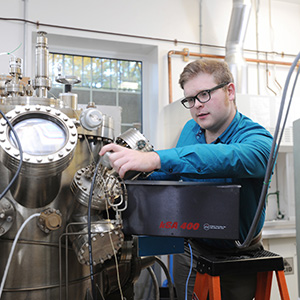 Simon Meynell, from Halifax, is a Masters of Science student in Physics. Supervised by Ted Monchesky, heŌĆÖs working on developing new magnetic materials to make high-speed and low-power electronic devices that would dramatically reduce their energy consumption and improve data storage.
Simon Meynell, from Halifax, is a Masters of Science student in Physics. Supervised by Ted Monchesky, heŌĆÖs working on developing new magnetic materials to make high-speed and low-power electronic devices that would dramatically reduce their energy consumption and improve data storage.
ŌĆ£WeŌĆÖre rapidly approaching an upper boundary on the amount of information you can store in your magnetic hard disk ŌĆö like a computer ŌĆö┬Āso thereŌĆÖs a push for unconventional methods for storing digital information,ŌĆØ explains Meynell. His research looks at how skyrmions (ŌĆ£little magnetic knots,ŌĆØ as he describes them)┬Āmay offer ways to store information at a greater density.
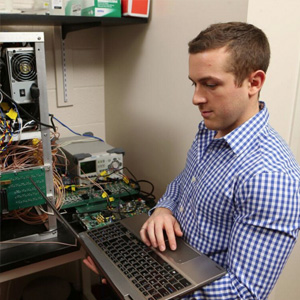 Chris Samson, originally from Little Anse, Nova Scotia, is a PhD student in Biomedical Engineering. His masterŌĆÖs work at Dal was supported by an NSGS award and focused on improving electronics within ultrasound imaging and surgical treatment equipment to better manage large amounts of data faster and improve image quality. The resulting advances aim to improve patient care and help establish Nova Scotia as a leader and innovator in biomedical engineering.
Chris Samson, originally from Little Anse, Nova Scotia, is a PhD student in Biomedical Engineering. His masterŌĆÖs work at Dal was supported by an NSGS award and focused on improving electronics within ultrasound imaging and surgical treatment equipment to better manage large amounts of data faster and improve image quality. The resulting advances aim to improve patient care and help establish Nova Scotia as a leader and innovator in biomedical engineering.
ŌĆ£This is the best research group IŌĆÖve ever been a part of,ŌĆØ he says of his work in Jeremy BrownŌĆÖs lab. "Everybody is very intelligent, very friendly, basically interested in what theyŌĆÖre doing. Everybody is able to talk about what theyŌĆÖre doing, bounce ideas off of each other.ŌĆØ
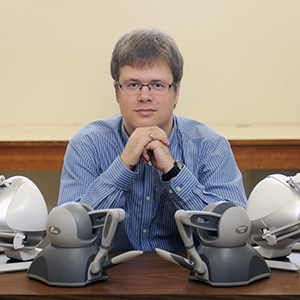 Shane Forbrigger, also from Halifax, is a masterŌĆÖs student in Mechanical Engineering whose research in Yajun PanŌĆÖs lab focuses on improving training tools for medical students and practicing physicians. Instead of physical models focused on a single ailment/practice, Forbrigger is focused on improving the controls interface for virtual simulations of minimally invasive surgeries.
Shane Forbrigger, also from Halifax, is a masterŌĆÖs student in Mechanical Engineering whose research in Yajun PanŌĆÖs lab focuses on improving training tools for medical students and practicing physicians. Instead of physical models focused on a single ailment/practice, Forbrigger is focused on improving the controls interface for virtual simulations of minimally invasive surgeries.
ŌĆ£I was interested in robotics and controls, and wanted to be able to contribute something thatŌĆÖs helpful to the world at large, not just a theoretical work,ŌĆØ he explains. ŌĆ£The end goal of my research is to produce something that can be used in these simulators: How do we create a realistic interface so the interaction between the human and the computer environment feels as real as possible?ŌĆØ

